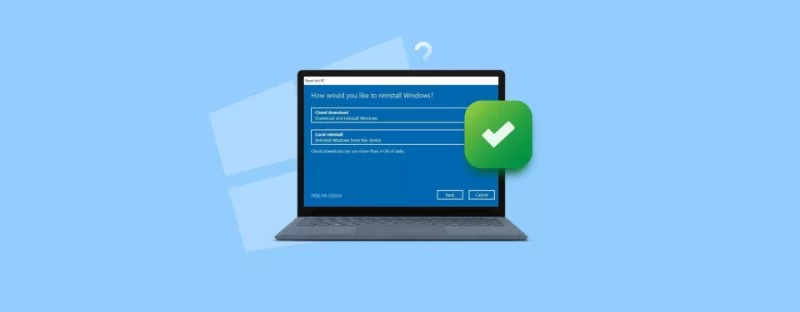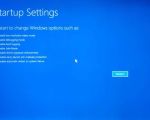- how-to-reinstall-windows-without-losing-your-files
- why-reinstalling-windows-might-be-necessary
- preparation-before-reinstallation
- steps-to-reinstall-windows-without-data-loss
- real-case-when-reinstall-saved-the-day
- when-to-get-professional-help
1. How to Reinstall Windows Without Losing Your Files
Facing system slowdowns, unexplained errors, or persistent malware? Reinstalling Windows can be a powerful fix—but the fear of losing personal files often holds people back. The good news? You can learn exactly how to reinstall Windows without losing your files using built-in features and smart prep. Whether you’re a student with essays, a designer with gigabytes of media, or just someone who doesn’t want to say goodbye to decades of family photos, this guide is for you.
2. Why Reinstalling Windows Might Be Necessary
Even the most powerful PC can become sluggish over time. Software conflicts, outdated drivers, or corrupted system files may lead to performance issues that no amount of troubleshooting seems to solve. In such cases, reinstalling Windows provides a clean slate without the need to wipe your entire hard drive.
2.1 Symptoms That Call for a Reinstall
If your system takes more than 3–5 minutes to boot, apps crash frequently, or updates constantly fail—these are red flags. A reset may be more efficient than manually fixing each symptom. Moreover, malware infections often burrow deep into the system, and reinstalling Windows is one of the few ways to remove them entirely without leaving behind traces.
2.2 Don’t Fear the Reset Button
Windows 10 and 11 offer built-in tools to reinstall the OS while preserving your personal data. This modern approach replaces the old method of formatting your disk, making reinstallation far more accessible and less risky.
3. Preparation Before Reinstallation
Preparation is the key to a successful reinstall. Although the built-in reset feature claims to keep personal files, creating a backup ensures you’re protected in case anything goes wrong. Use an external drive, cloud storage, or both.
3.1 Backup Must-Haves
Documents, images, browser bookmarks, saved passwords, and software license keys should all be safely backed up. Tools like OneDrive, Google Drive, or a USB hard drive come in handy here. Also, keep a record of installed applications—you’ll need to reinstall them manually afterward.
3.2 Disable BitLocker and Secure Boot
If BitLocker encryption is enabled, turn it off before proceeding. Secure Boot and BIOS password protections might also interfere with certain reinstall options, especially if booting from USB. Take five minutes to review these settings to avoid unnecessary headaches later.
4. Steps to Reinstall Windows Without Data Loss
There are multiple ways to reinstall Windows, but two methods stand out when you want to keep your files intact: the “Reset this PC” option and the Windows Media Creation Tool.
4.1 Method 1: Reset This PC
Go to Settings > Update & Security > Recovery and select “Reset this PC.” Choose the “Keep my files” option. Windows will reinstall itself while keeping your personal documents untouched. However, it will remove applications, so you’ll need to reinstall your programs afterward.
4.2 Method 2: Using Windows Media Creation Tool
Download the Media Creation Tool from Microsoft’s website. When running the installer, choose “Upgrade this PC now” and then select the option to keep personal files and apps. This is particularly useful for repairing broken system files without starting from scratch.
4.3 Post-Installation Essentials
After the reinstall, update drivers and reinstall essential software. Don't forget to activate Windows again using your license key. A freshly installed OS also means better responsiveness and improved security, so it’s worth the effort.
5. Real Case: When Reinstall Saved the Day
When freelance video editor Martin faced relentless system crashes during rendering sessions, he feared the worst—hardware failure. But after a careful reinstall of Windows using the “keep files” option, the problem vanished. He later discovered that corrupted system libraries were to blame. “It saved me from spending hundreds on new hardware,” Martin said. Reinstallation can sometimes be the most practical and budget-friendly solution.
5.1 Lessons Learned
Martin's story is a powerful reminder: a sluggish or malfunctioning Windows system isn’t always a death sentence. Often, it's just in need of a fresh foundation. Knowing how to reinstall without losing your data puts control back in your hands.
6. When to Get Professional Help
While DIY reinstallations are becoming more user-friendly, not everyone feels comfortable poking around BIOS or modifying boot orders. If your machine is severely infected, unbootable, or tied to sensitive work, consulting a technician might be wise. A professional service can also help with custom backup plans or transferring complex software setups.
6.1 Trustworthy Support Sources
For those unsure where to turn, Computer Repair offers tailored guidance and services for system reinstallation, data backup, virus removal, and more. Whether you’re a student trying to save your thesis or a gamer protecting hundreds of gigabytes of content, their expert techs ensure you don’t lose what matters most.






























